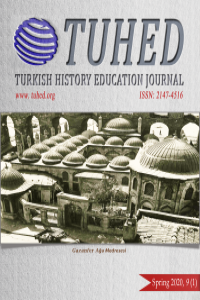Abstract
When, why and how did the chronology, which we see as an inseparable part of history, has been attached to the science of history? Which time theory is this chronology is based on and is this theory still valid? How can a discipline that is so introverted with the concepts of time and change, misunderstand both concepts? Converts natural time into an artificial and metric chronology, and change into a status quo? In this study, which searches for the answers to all these questions, Tanaka defends the thesis that there was history before the addition of chronology, therefore, contrary to the common belief, chronology and history can be separated and that such a distinction will strengthen history. In order to defend his thesis, the author tries to reveal the pre-modern understanding of time, the reasons behind the articulation of chronology to history, and the opportunities to create a historiography that has not been completely purified from chronology but with reduced chronology emphasis.
Keywords
References
- Breisach, E. (2003). On the future of history. The postmodernist challenge and its aftermath. Chicago: Th University of Chicago.
- Chartier, R. (2011). History, time, and space. Republics of Letters: A Journal for the Study of Knowledge, Politics, and the Arts, 2(2), 1-13. Erişim: http://rofl.stanford.edu/node/100
- Fomenko, A. T. (2003). History: Fiction or science? New York: Delamere Publishing.
- Gottfried Leibniz: Metaphysics. (t.y.). Internet Encyclopedia of Philosophy. Erişim: https://www.iep.utm.edu/leib-met/
- Hawking, S. (2012). Zamanın kısa tarihi. İstanbul: Alfa.
- Newton, I. (1998). Doğal felsefenin matematiksel ilkeleri (Çev. A. Yardımlı) İstanbul: İdea.
- Tanaka, S. (2019). History without chronology. Lever Press. Erişim: https://www.jstor.org/stable/10.3998/mpub.11418981
- Tanaka, S. (2015). Reconceiving pasts in a digital age. Historein, 15 (2), pp. 21-29.
- Tanaka, S. (2012). Pasts in digital age. J. Dougherty & K. Nawrotzki (Eds), Writting History in a Digital Age. University of Michigan. Erişim: https://writinghistory.trincoll. edu/revisioning/tanaka-2012-spring/
- Tanaka, S. (2004). New Times in Modern Japan. Princeton: Princeton University. Erişim: https://www.jstor.org/stable/j.ctt7stft
- Tanaka, S. (1993). Japan’s Orient: Rendering Pasts into History. Berkeley: University of California.
- Tekeli, İ. (2019, 6 Mart). Tarih yazıcılığında sorun alanları. İstanbul Üniversitesi, Edebiyat Fakültesi, Sosyoloji Bölümü, Çarşamba Toplantıları-38. İstanbul.
- White, H. (1973). Metahistory: The Historical Imagination in Nineteenth-Century Europe. Baltimore: Johns Hopkins University.
Abstract
Tarihin ayrılamaz bir parçası olarak gördüğümüz kronoloji ne zaman, niçin ve nasıl tarih bilimine eklemlenmiştir? Bugün kullandığımız kronoloji hangi zaman teorisini esas alır ve bu teori hala geçerli midir? Zaman ve değişim kavramları ile bu derece içli dışlı olan bir disiplin nasıl olur da her iki kavramı da yanlış anlar? Doğal zamanı, yapay ve metrik bir kronolojiye, değişimi ise statükoya dönüştürür? Tüm bu soruların cevaplarını arayan bu çalışmada Tanaka kronolojinin eklenmesinden öncede de tarihin var olduğu, dolayısıyla sanılanın aksine kronoloji ile tarihin ayrılabileceği ve böyle bir ayrımın tarihi güçlendireceği tezini savunur. Yazar, tezini savunmak amacıyla bu kitapta modernite öncesi zaman anlayışını, kronolojinin tarihe eklemlenmesinin arkasında yatan nedenleri ve kronolojiden tamamen arındırılmış değil ama kronoloji vurgusu azaltılmış bir tarih yazımının yaratacağı fırsatları ortaya koymaya çalışır.
Keywords
References
- Breisach, E. (2003). On the future of history. The postmodernist challenge and its aftermath. Chicago: Th University of Chicago.
- Chartier, R. (2011). History, time, and space. Republics of Letters: A Journal for the Study of Knowledge, Politics, and the Arts, 2(2), 1-13. Erişim: http://rofl.stanford.edu/node/100
- Fomenko, A. T. (2003). History: Fiction or science? New York: Delamere Publishing.
- Gottfried Leibniz: Metaphysics. (t.y.). Internet Encyclopedia of Philosophy. Erişim: https://www.iep.utm.edu/leib-met/
- Hawking, S. (2012). Zamanın kısa tarihi. İstanbul: Alfa.
- Newton, I. (1998). Doğal felsefenin matematiksel ilkeleri (Çev. A. Yardımlı) İstanbul: İdea.
- Tanaka, S. (2019). History without chronology. Lever Press. Erişim: https://www.jstor.org/stable/10.3998/mpub.11418981
- Tanaka, S. (2015). Reconceiving pasts in a digital age. Historein, 15 (2), pp. 21-29.
- Tanaka, S. (2012). Pasts in digital age. J. Dougherty & K. Nawrotzki (Eds), Writting History in a Digital Age. University of Michigan. Erişim: https://writinghistory.trincoll. edu/revisioning/tanaka-2012-spring/
- Tanaka, S. (2004). New Times in Modern Japan. Princeton: Princeton University. Erişim: https://www.jstor.org/stable/j.ctt7stft
- Tanaka, S. (1993). Japan’s Orient: Rendering Pasts into History. Berkeley: University of California.
- Tekeli, İ. (2019, 6 Mart). Tarih yazıcılığında sorun alanları. İstanbul Üniversitesi, Edebiyat Fakültesi, Sosyoloji Bölümü, Çarşamba Toplantıları-38. İstanbul.
- White, H. (1973). Metahistory: The Historical Imagination in Nineteenth-Century Europe. Baltimore: Johns Hopkins University.
Details
| Primary Language | Turkish |
|---|---|
| Journal Section | Review Articles |
| Authors | |
| Publication Date | May 24, 2020 |
| Submission Date | April 20, 2020 |
| Acceptance Date | May 22, 2020 |
| Published in Issue | Year 2020 Volume: 9 Issue: 1 |
ANNOUNCEMENTS:
1- APA7 Referencing Style:
As of May 2024, TUHED will follow APA 7 (American Psychological Association) style for referencing and citation. For more information, please refer to the TUHED template and writting guidelines.
2- Early Release:
According to the TUHED's new publication policy, the articles which have completed the evaluation process will be published online-first. It will no longer be necessary for manuscripts to wait until the “next issue”. Early Release articles will receive an international identification code (DOI), and identified page numbers.
3- Ethics Committee Approval:
In accordance with the ULAKBİM decision of 25 February 2020, Ethics Committee Approval must be obtained for studies on people (without age restrictions), this approval must be specified in the Method section of the article and signed Ethics Committee Approval must be uploaded to the system. Applications that do not meet these requirements will not be considered for publication.
4- New Publication Policy
Beginning from Spring 2021 issue TUHED will require all Turkish manuscripts to contain a full-text English translation. Manuscripts submitted in Turkish will be requested to have full-text English translation if they are accepted for publication after the review process.
Turkish History Education Journal site and its metadata are licensed under a Creative Commons Attribution-NonCommercial 4.0 International License
Permissions beyond the scope of this license is available at COPYRIGHT


